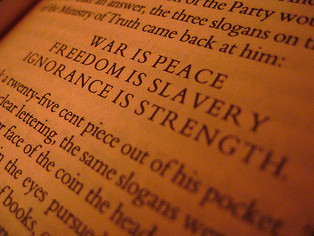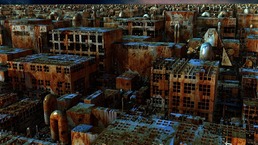|
by Amanda Rennie The world is dark, dismal, messy; there is a teenager who is, believably, old enough, clever enough, mature enough, independent enough to make life-altering decisions. 16 or 17 is a good age because then they can rebel against adults, not go to school, and have an intense and passionate relationship. This teenager isn't like all the other teenagers. This teenager can make a difference. Yawn. It started with the vampire craze, but the publishers of young adult fiction have fully submersed themselves in Dystopia: everywhere and everything is terrible, and only one young person has the ability to change it and make the world a better place. Young adult authors, lots of them, have been churning out trilogies (ALWAYS trilogies) with the same stock characters and fabled ending for years now. And guess what? It's only becoming more generic.  Orwell's "1984" Image credit: jason ilagan via flickr Orwell's "1984" Image credit: jason ilagan via flickr Many of us are familiar with, if not well read in, dystopian novels of the past, like Orwell’s 1984 or Animal Farm, Bradbury’s Fahrenheit 451, or Golding’s Lord of the Flies. Something about Orwell and Bradbury’s stories, and whatever other dystopian stories still read in literature classes today, make them timeless. But what a dystopian novel is for teenage readers now and what it was for adult readers then differs greatly. For adults, the stories are actual allegorical social commentary. They have a real lesson. They contain complex and harrowing metaphors. Sometimes, they are scary and uncomfortable. But for teenage readers now (and adults (okay, me)) it seems to be nothing more than a shallow metaphor for a world that needs change, just beginning to skim off the top of a real social issue. Dystopian fiction is supposed to have something to say – a greater metaphorical meaning that invokes change or provokes thought, and modern YA dystopian novels aren’t doing this. Instead, it’s “worry not! It's nothing that a love triangle, some cliché action scenes, and a happy ending can't fix!” It’s like the author wants to open the reader’s eyes to something, but it’s too scary, too much of a commitment, to actually follow through. But here’s the truth: the world is scary sometimes.  Image credit: cpmacdonald via pixabay Image credit: cpmacdonald via pixabay Don't get me wrong - I love The Hunger Games. It is one of my favorite series of all time, and I reread it every New Years (Suddenly, I am thinking this is subconsciously symbolic). But I also blame Suzanne Collins for jumpstarting this era of YA dystopia. Maybe it’s my own bias, but Collins had something to say. She did it, and, in my opinion, she did it well. Therefore her story and characters exploded into something huge where suddenly the entire world couldn’t get enough. Why wouldn’t a budding author want to follow in those footsteps and ride the waves of her success? Perhaps “Why shouldn’t they?” is the better question. It has skyrocketed multiple authors into fame, with book deals, movie deals, and lots of Twitter followers. At this point, it’s becoming more about consumption than about having something, a message or a moral, to say. I guess it is understandable - authors have to make a living, too. How many times can a person and then another person and then another person say the same thing until it becomes redundant? Not many. Veronica Roth is one of the only YA dystopian authors in recent memory who attempted to break what seems like the editorial checklist for a successful YA dystopian novel, but she blew up her entire story at the same time in an effort to be inventive. Spoiler alert: (but quite honestly if you haven't read Divergent by now, you were never going to): you don't kill your main character and get away with it. Even having done that, though, her trilogy didn’t “say” much more than The Hunger Games did. Plus, people, including myself, were mad at her for not following the specified formula thoroughly. I can’t help but wonder if this dystopian era of young adult fiction is nothing more than a fad. Maybe I almost hope that it is. The supernatural, vampire phase fizzled out pretty quickly just a couple of years ago. While there is a good premise to dystopian fiction, it is probably time for us to move on and figure out something else to say, or even a way to say it better. I don’t think the next generation of kids will be reading The Maze Runner in their middle school reading classes, but I do think that they will read Animal Farm. Sometimes, this trend makes me worry that there are no stories left to tell because these commercialized authors seem to be forcing themselves to write into these popular genres. I guess I shouldn’t complain; dystopia is much more interesting than vampires and werewolves and more vampires. So, do I have an unpopular opinion and these books are actual literary canon? Only time will tell. May the odds be ever in their favor.
0 Comments
Leave a Reply. |
Archives
July 2024
Categories
All
|
|
Glassworks is a publication of Rowan University's Master of Arts in Writing 260 Victoria Street • Glassboro, New Jersey 08028 [email protected] |
All Content on this Site (c) 2024 Glassworks
|

 RSS Feed
RSS Feed
